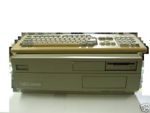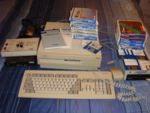Amiga
The Amiga, which was sold by Commodore was one of the most underrated computers of the 1990's.
The amiga was designed by Jay Minor and was originally developed as the Loraine under the brand 'Hitoro'. The Amiga is noted for it's use of the 68000 cpu, and a set of custom coprocessors.
Originally Atari had funded the later stages of the Amiga's development but they had lowballed the final price. HiToro shopped themselves, and Commodore had found an opportunity to snatch the next generation machine from Atari.
Contents
Models
Amiga 1000
The Amiga 1000 was the first model to ship from Commodore.
Amiga 500
The Amiga 500 was a Commodore 64 style influenced Amiga. It included 512kb of system ram, and a single floppy drive built in. The chipset used in the Amiga 500 would be known as the 'OCS'.
Amiga 600
This should have been a low cost version of the 500, with the updated ECS chipset, however it wound up costing more then the Amiga 500. This was to replace the 500, at the time of the 1200's release.
Amiga 1200
The Amiga 1200 used a 68020 cpu, and the new AGA chipset that also shipped in the Amiga 4000. It also was a single 'wedge' like the Amiga 600/500.
Amiga 1500
This Amiga was a desktop model that did NOT include any ISA slots preventing the bridgeboard upgrade. Otherwise it's identical in specs to the Amiga 2000.
Amiga 2000
The Amiga 2000 was a desktop version of the Amiga 500. It featured Zoro expansion slots, the same 68000 cpu, and 1mb of ram as standard. The 2000 also included some 16bit and 8bit ISA slots allowing a bridgeboard card for IBM XT/AT emulation, and the ability to use IBM PC cards
Amiga 2000HD
The Amiga 2000HD was a Amiga 2000 that included a hard disk that had been installed at the factory. Otherwise it was the same as an Amiga 2000.
Amiga 3000
The Amiga 3000 was a 68030 Amiga that used the ECS chipset, and was fully 32bit. The Amiga 3000 used ZIP ram instead of DIP, at the time allowing for faster memory access. However the industry at large would shun the ZIP chip, and instead move to the SIMM. This is a MAJOR obstical for anyone trying to upgrade an Amiga 3000 today.
Another thing worth noting is that the first Amiga 3000's shipped before the OS was ready. They have a beta version of the unrelease 1.4 in ROM. It is used primarily for loading either a patched version of 1.3 or 2.0 from the hard disk. As the os wasn't quite ready, Commodore shipped a number of upgrades on floppy that would replace the kickstart files that were on a separate partition on the hard disk.
Amiga 3000UX
The 3000UX was an Amiga 3000 that included a SCSI tape drive, and came with Commodore's SYSVr4 port. This model could have saved the company as SUN wanted to rebrand the machine, and make MILLIONS with it. Naturally Commodore declined such a deal.
Amiga 3000T
The Amiga 3000T was basically the same as the Amiga 3000, however it was in a Tower case, giving more room for disk drives, and expansion slots.
This is a very RARE model.
Amiga 4000
The Amiga 4000 was based around the 68040 cpu, and the AGA chipset. This was the desktop model.
Amiga 4000T
The chipsets
These chips were to offload as much of the IO from the main 68000 as possible freeing it for cpu only work. It was a novel idea at the time as most machines only had room for a floating point (math) coprocessor, such as an 8087, or 688881. The chips include:
OCS
ECS
AGA
The Operating System
AmigaDOS was a port of TripOS to the 68000 cpu. The GUI intuition ran ontop of it.


